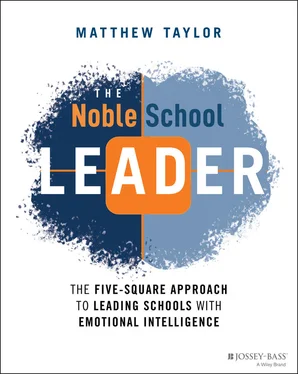I returned from Teleos seeing opportunities to apply this new EI language and understanding everywhere I looked. I came to see the conditions we are currently creating by default in our schools as an emergency. Our overreliance on data‐driven systems and protocols leaves adults and children in our schools feeling less connected and experiencing less care from one another. Classrooms and adult teams are less inclusive of the identities people bring to them. The structures and pace of the work take away the space and time that the adults need to be able to ground themselves in their personal WHY for doing the work, and to be able to be fully present as themselves in the moment. I find myself working with a generation of highly technical school leaders in highly structured schools who are deeply unhappy and feeling unsuccessful in their work. Many feel stuck and cannot figure out why. Others know why they are stuck but feel powerless to change within their existing system. Most of them wonder how long they will be able to last as school leaders.
With the perspective gained through the EI coaching, I felt called to advocate for change. Doug McCurry and Dacia Toll, AF's co‐CEOs, embraced this work and created the opportunity to share it with our AF principals through cohort training and one‐on‐one leader coaching. I had the privilege of making my passion for EI leadership my day job for seven years. During that time, I trained and coached many of the leaders in our organization. It was through that work that my colleagues and I created the tools for the practical application of EI theory. We discovered that the training and coaching is relevant for leaders at every level of seniority. Actually, there is usually a greater need for this social–emotional approach to development the higher one travels up the leadership pipeline. We also found that, unless the leaders at the top of an organization are doing their own social–emotional work, it is not likely that others down the chain will be able to do so effectively.
Since starting the Noble Story Group, I have worked with hundreds of leaders in over 60 school and nonprofit organizations across the country. This work has confirmed in very powerful ways that what I experienced as a teacher and school leader is playing out all across the education sector and beyond. A lopsided focus on building and measuring technical skills has created organizational conditions that are not conducive to people—children and adults—reaching their full potential. All of my clients share the same top three organizational challenges: people experiencing inequitable and exclusive conditions across lines of difference; teachers and leaders feeling that their work is not sustainable over time; and leaders not knowing how to challenge people while staying personally connected. Everyone I work with feels a deep desire to change. Harnessing EI has proven to be an effective way to support them.
Science can broadly be separated into the theoretical and applied. EI theory is not new. What we have done is develop a practical, applied approach to using EI in leadership development. This means helping leaders build the awareness of self and others and generate effective self‐management and relational strategies to become stronger adaptive leaders. Over time, clear patterns have emerged about the internal obstacles—the self‐limiting mindsets—that get in the way of this growth. I have found that there are archetypical self‐limiting mindsets that leaders at all levels of leadership must contend with inside of themselves to reach their potential. This book describes these seven self‐limiting mindsets in detail and offers an approach to enable leaders to transcend them.
I wrote this book for school leaders and for their managers who are looking for ways to overcome their brick walls. I introduce readers to the seven most common school leader self‐limiting mindsets that have emerged as patterns of behavior as I have applied it over the last decade. Leaders will determine which of the seven self‐limiting mindsets hold them back and develop their own self‐management strategies to overcome them. For leaders, this is a self‐guided tour “below the surface” to build self‐awareness about both self‐limiting mindsets that get in their way and the source of their personal power that will support them to build new mindsets and behaviors. For managers it is a field guide for supporting leaders “below the surface” and creating the learning conditions that make that work possible. Adopting its language and approaches with fidelity can jump‐start transformative learning at every level of a learning community.
I know school leaders. We choose this work because of our personal commitments to children and to making this world a better place. I hope that you chose this book to become a better leader. I hope your personal mission and commitment to students helps you stick with the deep personal learning you will be asked to take on in these pages. The learning below the surface will make you a better human being for your students, your team, your family, and the rest of the world.
I would like to thank Delea Deane‐Allen, Brian Behrman, and my editor Adaobi Obi Tulton for their wise feedback through the writing process; my family and my Noble Story Group partners for their unflagging support; and most of all my dad for editing every inch of this book with his writer's eagle eye.
Matt Taylor is the founder and CEO of The Noble Story Group, a consulting group that leverages emotional intelligence to unleash leadership potential through the power of social–emotional leadership to promote sustainable, thriving, and equitable communities. He is a co‐author of Daniel Goleman's Building Blocks of Emotional Intelligence primer series and a contributor to School Administrator magazine, the Fordham Institute's Education Gadfly , and other coaching blogs.
I Preparing to Do Mindset Work
Chapter 1:Seven Invisible Obstacles to Strong School Leadership
Chapter 2:Building New Mindsets and Behaviors with Emotional Intelligence (How You Will Drive Your Learning Using This Book)
Chapter 3:Preparing for the Learning Journey by Connecting to Your Power
1 Seven Invisible Obstacles to Strong School Leadership
Every school and educational organization is led by leaders who are seeking to develop and get better. All are learning skills and knowledge that will make them stronger, but few of them are able to focus on what is truly holding them back from succeeding, or from reaching their next level of personal growth.
The most significant obstacles to growth are “below the surface” of skills and knowledge. This book will refer to what lies below the surface as mindsets. Mindsets are made up of the elements that dictate our habits of human interaction: values, beliefs, motives, traits, and other personal attributes.
Every leader arrives in their role with mindsets that serve them and mindsets that get in their way, or self‐limiting mindsets. Leaders will work through some of these self‐limiting mindsets on their own, but with others they will hit a brick wall. These more elusive, deep‐seated habits of mind and behavior have been with leaders most of their lives. They tend to be so deeply engrained that leaders—and people in general—think of them as “just the way I am.” When we step into the role of leadership for the first time or are promoted to a new level, these self‐limiting mindsets often become more pronounced or take on new significance.
Over the last decade I have been immersed in the coaching and training of adaptive leadership—the human, emotions‐driven side of leadership where there are no right or wrong answers and decisions come down to choosing between competing values. Developing leaders through this adaptive lens, my colleagues and I have noticed several archetypes emerging in the kinds of self‐limiting mindsets that are common to school leaders at all levels. While these archetypes aren't new (most are leadership types that have been widely studied in the fields of social psychology and business), we are bringing them together in a new way and applying a new lens to addressing them. We have identified a group of seven self‐limiting mindsets that we see in various combinations across leaders, roles, and schools.
Читать дальше












